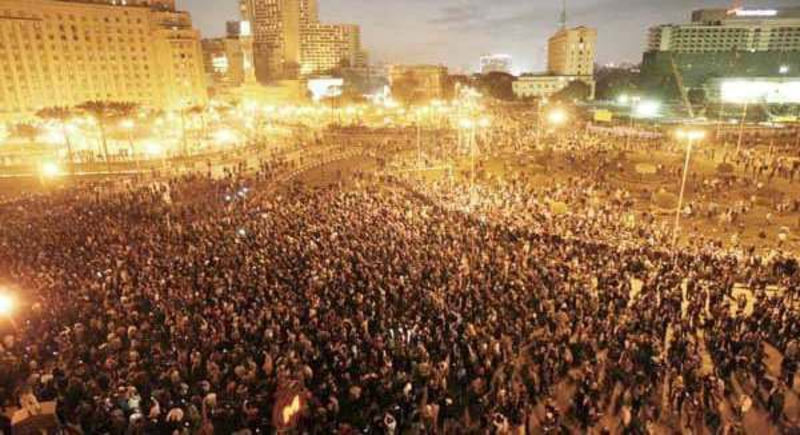Published by Asia-Pacific Journal/Japan Focus and cross-posted at Z-Net. Thanks to editor Mark Selden for his fine work and encouragement.
 Since early 2011, major peoples’ revolutions have swept through North Africa and the Middle East. Most recently, the revolts engulfed Syria and Libya, leading to enormous violence in both countries and a NATO-led bombing campaign in the latter. By far the most important to the United States was the uprising in Egypt, where the military took advantage of a popular insurrection to stage a coup against Hosni Mubarak, a 30-year U.S. ally whose military forces and intelligence services had – and continue to have – extremely close ties to Washington. In August, Mubarak will face trial for corruption and murdering protesters during the uprising that engulfed Cairo’s Tahrir Square for 18 days in January. He could face the death penalty if convicted.
Since early 2011, major peoples’ revolutions have swept through North Africa and the Middle East. Most recently, the revolts engulfed Syria and Libya, leading to enormous violence in both countries and a NATO-led bombing campaign in the latter. By far the most important to the United States was the uprising in Egypt, where the military took advantage of a popular insurrection to stage a coup against Hosni Mubarak, a 30-year U.S. ally whose military forces and intelligence services had – and continue to have – extremely close ties to Washington. In August, Mubarak will face trial for corruption and murdering protesters during the uprising that engulfed Cairo’s Tahrir Square for 18 days in January. He could face the death penalty if convicted.
As the mass and social media beamed the so-called “Arab Spring” around the world, analysts and pundits in the United States quickly began comparing the revolts to past uprisings, particularly those during the Cold War, which had shaken U.S. foreign policy. A favorite topic, particularly on Fox News, was Egypt’s purported similarity to the Iranian revolution of 1979, which toppled the pro-US Shah of Iran and eventually led to a Shiite Islamic state hostile to the United States. A few opportunistic neocon voices also compared the Obama administration’s public support for Mubarak’s opponents to Washington’s past actions to pressure Ferdinand Marcos and Suharto to end their dictatorial rule in the Philippines and Indonesia once popular uprisings had already sealed their fate.
But not a single analyst or journalist of note mentioned what remains one of the most significant rebellions against a US-backed tyrant of the past half-century: the student and worker uprising in South Korea in 1979 and 1980, which was mercilessly crushed by the Korean military with the US support. Korea didn’t even make the list of near-revolutions: in mid-February, PBS published a list of “30 Years of Uprisings” that had “brought down governments and transformed societies” or were either “dissipated” or “crushed.” Thelist included Iran, the Philippines, the Baltics, China’s Tiananmen Square, the 1997 Kosovo Rebellion against Serbia and the 1998 Bolivarian Revolution in Venezuela – but unaccountably skipped South Korea as well as Taiwan.
The deletion is perplexing. The South Korean democratic uprising of the 1980s was a transforming event in Korean history. It began with the assassination of dictator Park Chung Hee in October 1979 at the hand of his own CIA director, and culminated in an armed peoples’ uprising in May 1980 in the city of Kwangju against the reimposition of military rule by Lt. General Chun Doo Hwan, who put down the rebellion with great force. With Kwangju as its symbol, the uprising climaxed seven years later (1987) in a national revolt that, like Egypt’s, brought millions of ordinary citizens into the streets and forced the military to finally relinquish power. In the end, the Korean citizens’ movement created one of the most vibrant democracies in East Asia and changed the dynamics of the Cold War in Asia by giving voice to a democratic opposition that called for peace and the end of hostility toward North Korea.
The South Korean experience was also a textbook example of how a US administration deals with the toppling of a dictator who has long been friendly and subordinate to US economic and security interests, and how it handles the delicate task of ostensibly supporting “democracy” while taking steps, publicly and covertly, to maintain the essential elements of a system protective of US interests. The United States played a central role in Kwangju by granting permission to Chun to deploy a Korean Army division from the Joint U.S.-South Korean Command to Kwangju to crush the rebellion.
The Carter administration’s strategy as it responded to the Korean events first came to light in a trove of 4,000 declassified documents I obtained over a period of years in the 1990s under the Freedom of Information Act. I released those documents in 1996 and wrote about them in the Journal of Commerce, the daily newspaper where I once worked, and the Korean weekly Sisa Journal.
Those papers, some of which were further declassified in 2005 with the help of the National Security Archive in Washington, provide a perfect lens to illuminate how the Obama administration may have responded to the events in Egypt this year…
To read on, click here.

Tim,
Thanks so much for this textured, subtle (as always) analysis.
Might you comment on what is happening at Jeju Island, South Korea, with the state seizure and destruction of tangerine farms to make way for a nuclear naval base, and the violent political persecution of nonviolent demonstrators.
Observers are concluding that South Korea has reverted to a dictatorship.